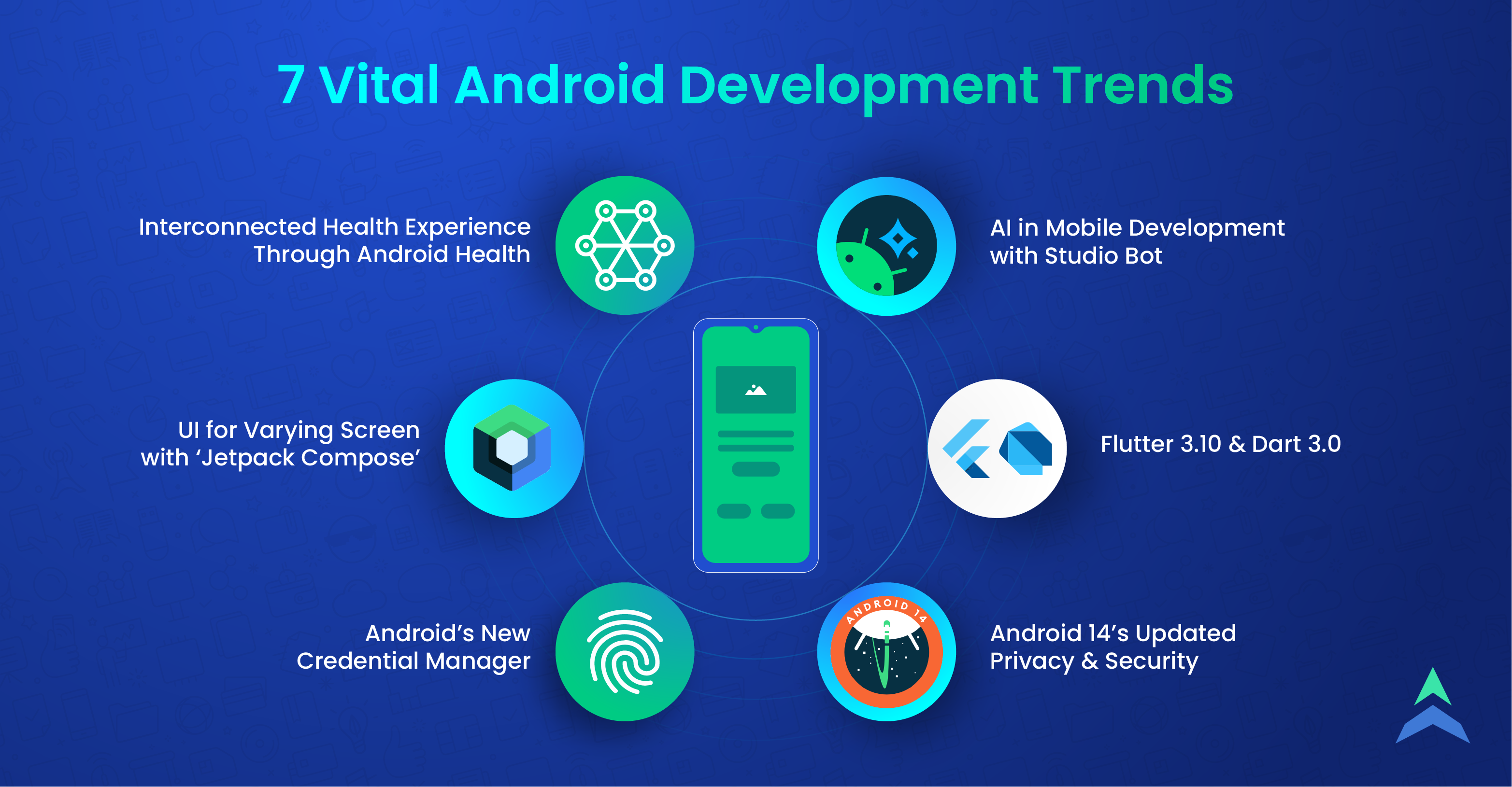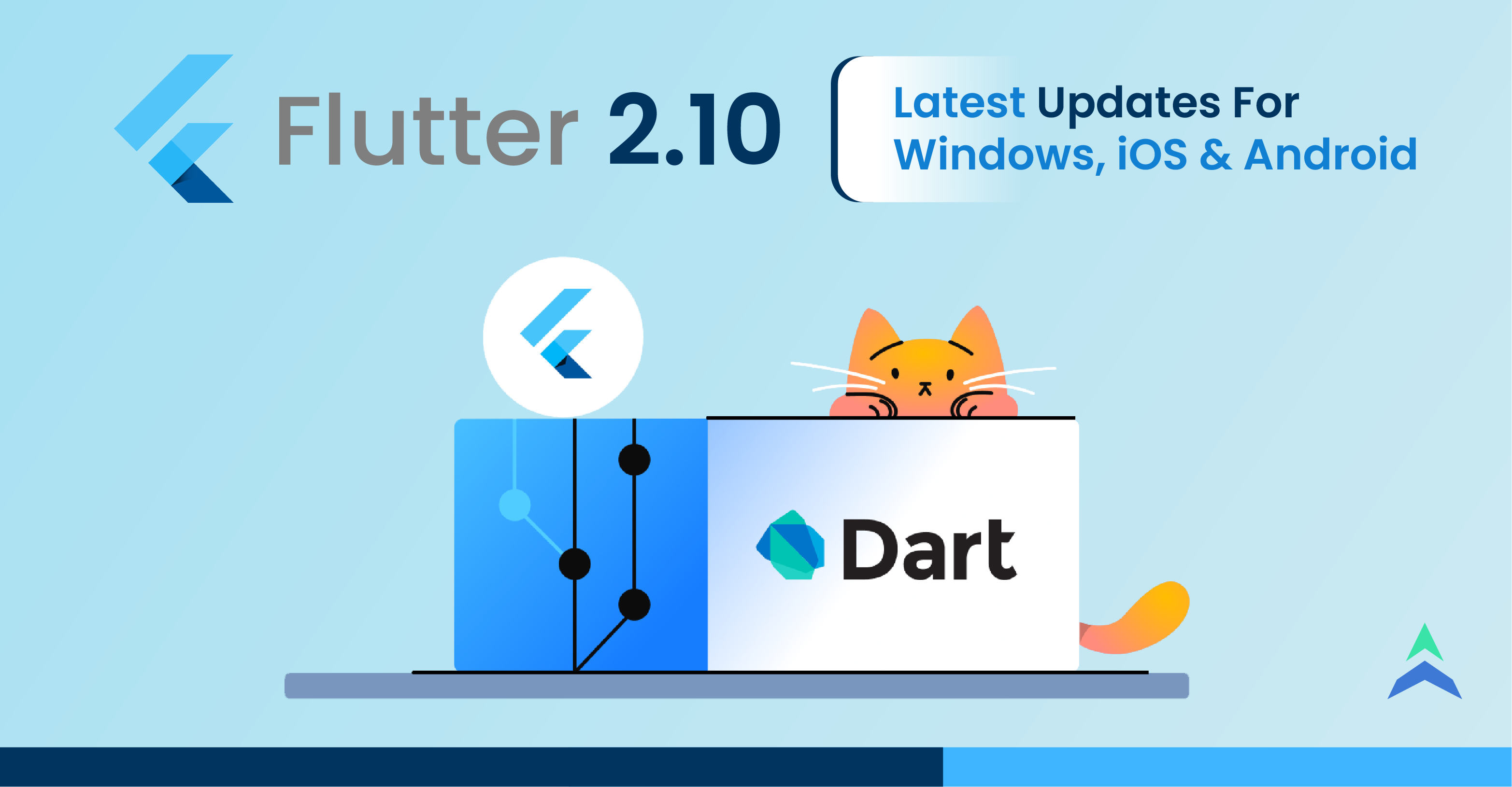Today, AI has revolutionized how we experience different services & has elevated user interactions to unprecedented heights. Notably, in the year 2023, Google has intensified its AI initiative, spearheading a momentous leap forward in Android development. The Google I/O 2023 event became a platform for unveiling groundbreaking advancements and novel products, leaving the tech community fascinated with AIs possibilities for the future. These developments will set the stage for a new paradigm in the world of technology.
Applications, whether enterprise or industrial, disrupt user experience when they evolve. For the developer community, there’s much more to explore, simplify end-to-end workflows, and improve productivity, for transforming the user experience. Let’s check the big hits from the Google I/O 2023 event for the developer community and how this will help them transform Android application development.
Accelerating User Experience: 7 Vital Android Development Trends to Embrace
AI, new features in Android Studio, Google’s UI toolkit, Android 14, and other advancements in the Android mobile development space have new ways to transform user experience and much more for the developer community to explore.

1. AI in Mobile Development with Studio Bot: Google, with its new ‘Studio Bot’, a conversational AI in Android Studio, will help developers generate codes, fix errors, and be more productive.
The new AI, Studio Bot, has been incorporated into Android Studio Hedgehog, which is the canary build of Studio featuring experimental features. Studio Bot has now entered the competitive realm of AI-based code generation, joining other prominent competitors like GitHub’s Copilot, OpenAI’s Codex, and AWS’s Code Whisperer. This addition is aimed at assisting developers in generating code, unit tests, and fixing errors more efficiently.
Studio Bot is built on an LLM (Codey), based on PaLM-2. By seamlessly integrating this LLM into the Android Studio IDE, Studio Bot offers many functionalities, including one-click actions and direct links to relevant documentation.
What sets Studio Bot apart is its privacy feature. You no longer need to send your source code to Google to utilize Studio Bot; only the chat dialogue between the developer and Studio Bot is shared, ensuring a more secure and private coding experience.
2.Interconnected Health Experience Through Android Health: Tracking the health of health app users is directly related to the data that devices collect. These devices collect data like- heart rate, oxygen level, workouts, etc., so developers need to deliver robust health & fitness apps for these devices, which will simplify the data’s access control and bring a more holistic view of data for users and developers.
Health Connect is an on-device android platform that allows health & fitness apps to use the same on-device data and offers APIs (Application Programming Interfaces) to help developers connect different Android apps for storing and sharing health data. The more devices/ platforms like, Fitbit, Samsung Health, Google Fit, etc., are involved, the more APIs Health Connect provides. With the latest update, there will be less fragmentation for developers as it will support 40+ data types and a single permission management framework to control user data permissions.
Health Services, an API surface for accessing sensor data on Wear OS devices, will allow developers to write code once and run it in all integrated applications.
3. UI for Varying Screen with ‘Jetpack Compose’: Jetpack Compose (a modern toolkit for building native UI) is updated with new tooling and library features that allow deep customization options and visually appealing effects. With updated tools in Compose, developers can now use UI project templates that use Compose and Material 3 by default, and with new updates in Material 3, more motion and interaction support can be added to many components.
Jetpack compose is Kotlin exclusive, meaning it is built around Kotlin, and cannot be used in another programming language like Java. Earlier developers had to work both in XML and Kotlin files, but now it’s not the case. With new features of Compose, it’s now done only in Kotlin, which has enhanced the development speed. Compose is also compatible with the existing Views present in Android.
The interoperability API feature of Compose is in a soundstage as it allows the coexistence of Compose and View in the codebase and includes improvement in startup time, application size, and build time.
4. Flutter 3.10 & Dart 3.0: The release of the latest Flutter 3.10 includes many improvements & new additions like components and component themes, updated visuals, and more, for web, iOS, Mac, etc.
In the latest update, Google announced advancements in its popular UI toolkit, Flutter 3.10, offering better designs and Mac/iOS enhancements for mobile, web, and desktop applications. Impeller has now become a primary production-ready rendering engine for iOS, Dart 3, x3 WEB Performance, and more with Flutter 3.10, which will improve the performance of animations & unpleasant visuals by harnessing the advanced capabilities of next-generation GPUs.
In its new update, Flutter 3.10 will support Dart 3, Support for SLSA Level 1, an Enhanced Version of Flutter for the Web, Enhanced DevTools, and Production-ready Impeller for iOS.
With the release of Flutter 3.10, users can now experience a significant performance boost on iOS applications as Impeller, the rendering runtime for Flutter, is enabled by default. By simply migrating to the latest version of Flutter, apps can take advantage of this enhancement, leading to improved performance and smoother user experiences.
In addition, web support in Flutter 3.10 has undergone optimization to reduce load times, making web applications built with Flutter more efficient and responsive. Moreover, Flutter 3.10 introduces a groundbreaking feature called “element embedding,” enabling seamless integration of Flutter content as if it were a CSS element. This breakthrough allows developers to effortlessly incorporate Flutter components within existing web pages or applications, opening up new possibilities for creating dynamic and engaging user interfaces.
With these advancements, Flutter continues to solidify its position as a versatile and high-performance framework, catering to both mobile and web development needs with unparalleled ease and efficiency.
In the latest version of Flutter, APIs can be directly called through dart bindings without needing an external plugin.
Dart 3.0 has added features like reduced null time errors, smaller compiled outputs, and records, patterns & class modifiers. The new patterns updated in language are structured data with records, destructuring of data back into individual elements, & pattern matching, and all of these support modern programming with abstract data types.
In the new class modifier, powerful access control for APIs is given to authors, providing more control for large enterprise apps.

5. Android 14’s Updated Privacy & Security: In its second developer preview of Android 14, larger space has been given to additional enhancements in privacy, security, performance, developer productivity, and user customization. The Photo Picker, a browsable & searchable interface, has been updated by Google, where users can specify which images and videos on the device apps are permitted to access rather than allowing apps to access their entire media library.
This API level must be greater than 24 for Android 14 to adhere to the technical requirements and functionalities, which will improve the security & privacy of users.
6. Android’s New Credential Manager: With the new alpha release of the credential manager, the new Jetpack API will allow developers to simplify their user’s authentication journey. Google expanded support for passkeys (passwordless authentication across Android & Chrome). This new update will enable users to create passkeys & store them in Google Password Manager.
7. Privacy Sandbox Updates for Android: Privacy Sandbox is a set of tools that aims to create standards for how advertisements & digital ads track Android users’ information without compromising private data. This initiative aims to develop technologies to limit covert tracking & show more relevant ads & content. For a more private advertising solution, Google announced a beta version that provides APIs designed for enhanced privacy which doesn’t use identifiers to track activity across apps & websites. Hence, advertising IDs will be replaced by privacy-preserving APIs.
In the latest Privacy Sandbox beta update, developers can use Attribution Reporting APIs that support debug keys, allowing developers to receive unaltered & privacy-enhanced reports from Attribution API.
The introduction of these new updates will elevate developers’ productivity by enabling them to effortlessly incorporate enhanced security measures, improved reliability, greater control, and a range of additional features that were previously challenging to implement. These updates aim to provide developers with a smoother and more feature-rich development experience.
The event provided a glimpse into an exciting future where AI, ML, and advanced technologies seamlessly integrate into our daily lives, enhancing our experiences and empowering us in ways we never thought possible.
To Wrap Up:
At Techment, a software development and data and product engineering company, we were thrilled to witness many opportunities to work in modern Android & iOS development. As a company that specializes in data engineering, we understand the significance of harnessing AI’s power. Our services align perfectly with the advancements showcased at the event, as we offer expertise in developing AI-powered applications with various forms and factors.
Additionally, our mobile development services, encompassing native and cross-platform solutions, align with enhancing user experiences through advanced technologies.
We offer expert services in developing AI-powered applications tailored to your needs. From native to cross-platform solutions, our mobile development expertise aligns seamlessly with enhancing user experiences through cutting-edge technologies. Contact us today and unlock the true potential of modern mobile development!
 All Posts
All Posts